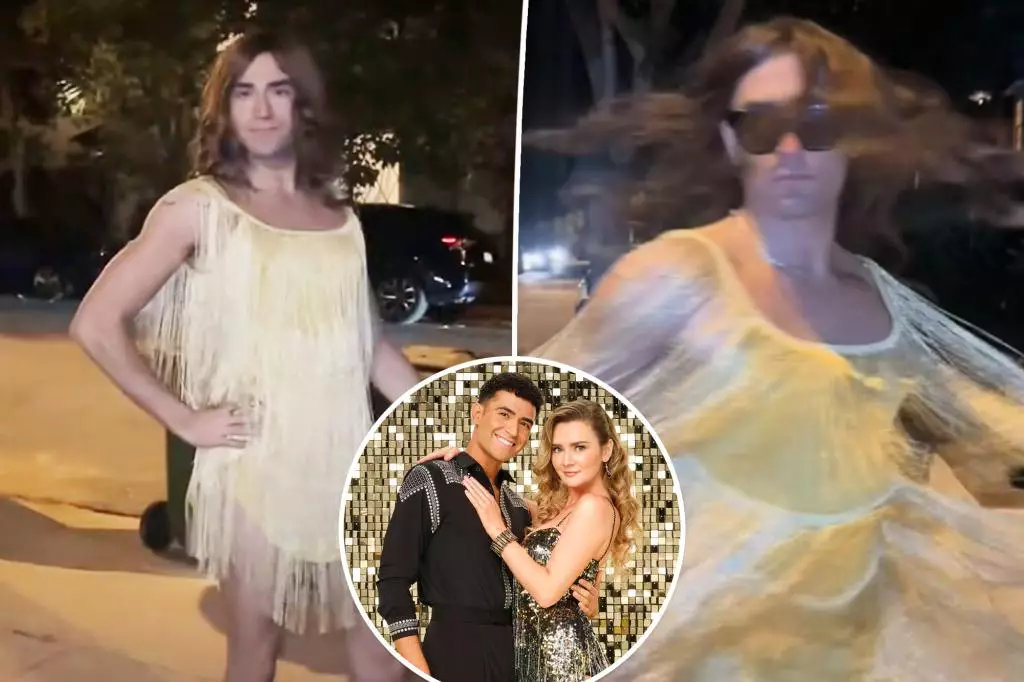In the vivid landscape of pop culture, Halloween allows individuals to express creativity through costumes, often drawing inspiration from notable or notorious figures. This year, Ezra Sosa, a professional dancer on “Dancing With the Stars” (DWTS), seized this opportunity by dressing up as his former partner, Anna Delvey. The choice of Delvey, who gained infamy for conning her way into elite social circles, brought both humor and a hint of audacity to his costume, encapsulating a playful yet ironic tribute that resonated with fans and followers alike.
On his TikTok account, Sosa shared a delightful video showcasing his costume, which included a glamorous gold fringe dress and a long brown wig that mimicked Delvey’s signature look. The addition of a bejeweled ankle monitor, a poignant symbol of Delvey’s tumultuous journey through the criminal justice system, was a keen detail reflecting Sosa’s commitment to authenticity in his portrayal. Clearly, he not only aimed to entertain but also to spark conversations about Delvey’s complex identity—one that intertwines glamour and scandal.
Sosa’s performance of lip-syncing Delvey’s infamous response during an exit interview from the show brought a comedic twist to the costume reveal. When questioned about what he would take away from the competition, Delvey candidly replied, “Nothing,” showcasing her unapologetic attitude that captivated audiences both during and after her time on the show. This exchange created a playful juxtaposition between Sosa’s devoted effort to embrace Delvey’s persona and the sharply humoristic tone inherent in her statement.
The reaction from fans was overwhelmingly positive, as comments on Sosa’s TikTok celebrated his costume as a moment of cultural commentary blended with humor. Phrases like “you just put the con in icon” highlighted how fans not only appreciated Sosa’s creativity but also engaged with the deeper societal meanings associated with Anna Delvey’s story. His costume served as a reminder of how reality can intertwine with performance, and how ephemeral celebrity often garners both admiration and critique.
Furthermore, Sosa’s authenticity resonated with many, as he playfully captioned his video, seeking Delvey’s approval. His request for validation from someone notorious for her controversial actions showcases a willingness to embrace both the absurd and the fashionable aspects of modern celebrity culture. This interaction between Sosa and the audience highlighted the current fascination with celebrity personas—how they evoke admiration, scorn, and even inspiration.
The bond formed between Sosa and Delvey during their DWTS journey took an interesting turn post-elimination. Their shared experience seemed to blossom into a camaraderie that extends beyond the dance floor. Sosa’s decision to commemorate Delvey’s stark one-word response with a tattoo on his back further underscores the loyalty he holds towards her—a gesture that binds their experiences, however fleeting. It reflects the complicated nature of partnerships forged in high-stakes environments, illustrating how shared struggles can lead to lasting connections.
In a world that thrives on drama, Sosa’s hypnotic dance and tribute to Delvey deliver a reminder of both the absurdity and the humanity within the whims of celebrity culture. His ability to turn a challenging moment into a celebration of creativity showcases the potential for humor to bridge divides in a society yearning for connection, even amidst controversy.
Interestingly, while Sosa danced into the spotlight, Delvey maintained her presence in the digital realm through her own social media updates. She playfully addressed her notoriety by sharing a clip of her own ‘arrest’ for “bad lip-syncing,” portraying her ability to display irreverence in a world that often scrutinizes her past. This dynamic reflects a deeper conversation about reinvention in the age of social media, where missteps can become platforms for humor and connection.
Though Sosa’s costume may have been born from a spontaneous spirit of Halloween, it inadvertently ignited conversations surrounding perception, loyalty, and celebrity culture. In a society that often erodes the distinctions between villain and hero, Sosa’s creation invites both laughter and reflection, capturing the essence of what it means to playfully acknowledge a complex figure like Anna Delvey. Hence, while they may have left DWTS early, their exit has sparked dialogues that are far from finished—a testament to the enduring allure of reinvention, humor, and loyalty in the ever-evolving fabric of popular culture.

